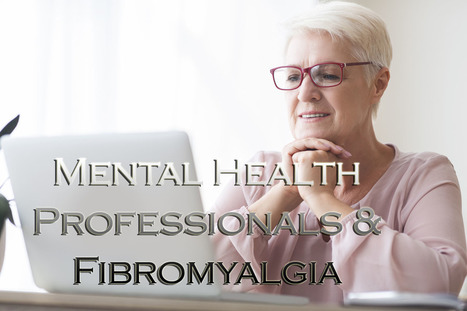Fibromyalgia pain is not just physical. Around 30% of individuals experience depression, anxiety, or some form of mood disturbance/swing. Fibromyalgia is still being researched if it causes these conditions or vice versa, but what is clear is that when the mental state gives in to the physical pain, your pain gets worse and worse.
A doctor may recommend a:
- Counselor
- Psychologist
- Psychiatrist
Symptoms are varied and impact an individual's life in ways that go beyond physical pain. Fatigue alone can be enough to alter lifestyle in a negative way, which affects mood.
Taking control of symptoms usually means taking a multi-disciplinary approach that includes:
- Medications
- Physical therapy
- Psychology
Mental and emotional therapy could be a part of a treatment plan.
Depression and Anxiety Difference
Depression and anxiety are sometimes put in the same category. Symptoms can include depression and anxiety occur at the same time but they are not synonymous disorders. Depression is characterized by chronic sadness. Individuals handle depression, their own way. Some cry or lash out in anger/frustration. Some days are spent in bed, other days/nights are spent eating excessively, as a response to the pain. The most important thing is recognizing the change in behavior. Talk to your doctor or a therapist.
Anxiety is known for feelings of panic, fear, and excessive worry. Individuals feel their heart is racing that can get confused with a heart problem.
Fibromyalgia Depression Connection
To understand how fibromyalgia relates to depression and anxiety, and see the difference between depression and anxiety, here are some symptoms.
The symbols show symptoms most associated with the disorder. However, it's possible to experience less sleep than normal if you have depression, but the more common symptom is sleeping more than usual.
Finding a Mental Health Professional
Professionals include:
- Licensed professional counselors (PCs)
- Psychologists
- Psychiatrists
These professionals are trained to diagnose and treat mental/emotional issues. Your doctor can help in figuring out which is best for you.
- Licensed professional counselors require a master's degree in counseling and are approved to diagnose and treat mental and emotional disorders.
- Psychologists are considered as a separate group of non-physician mental health professionals. They have a doctorate and are approved to treat emotional problems using therapies like cognitive-behavioral therapy.
- Psychiatrists are medical doctors that are licensed to prescribe medications to help depression and anxiety, along with several mental disorders.
Adding the impact this disorder has on a person's mental and emotional state can seriously damage their quality of life. Recognizing when the pain is not just physical is difficult. Therefore setting up a telemedicine/video conference with a mental health professional could help in dealing with the mental stresses that come with fibromyalgia. Even for those that don't require medication seeing a mental health professional can be highly beneficial.
You can openly talk about experiences having to do with fibromyalgia, how it affects your family, etc, which is therapeutic in itself. Do not hesitate to seek the help of a mental health professional. The focus is to help you feel better, become educated on ways to help yourself and improved quality of life.



 Your new post is loading...
Your new post is loading...








Delete Comment
https://pijnpillen.com/Producten/buy-flakka-a-pvp/
https://pijnpillen.com/Producten/buy-ultram-online/
https://pijnpillen.com/Producten/ketamine-poeder-kopen/
https://pijnpillen.com/Producten/buy-micro-mushrooms/
https://pijnpillen.com/Producten/carisoprodol-nederland-kopen/
https://pijnpillen.com/Producten/koop-natriumcyanide/
https://pijnpillen.com/Producten/koop-vicodin-online/
https://pijnpillen.com/Producten/koop-dmt-netherland/
https://pijnpillen.com/Producten/koop-dexedrine/
https://pijnpillen.com/Producten/koop-vyvanse-online/
https://pijnpillen.com/Producten/koop-morphine/
https://pijnpillen.com/Producten/buy-4-aco-dmt-usa/
https://pijnpillen.com/Producten/oxycodon-hcl-kopen/
https://pijnpillen.com/Producten/koop-suboxone-strips/
https://pijnpillen.com/Producten/koop-percocet-online/
https://pijnpillen.com/Producten/koop-oxycontin-online/
https://pijnpillen.com/Producten/buy-flakka-a-pvp/
https://pijnpillen.com/Producten/fentanyl-pleister-kopen/
https://pijnpillen.com/Producten/buy-seconal-sodium/
https://pijnpillen.com/Producten/fentanyl-poeder-kopen/
https://pijnpillen.com/Producten/koop-morphine/
https://pijnpillen.com/Producten/buprenorfine-kopen/
https://pijnpillen.com/Producten/koop-vyvanse-online/
https://pijnpillen.com/Producten/carisoprodol-nederland-kopen/
https://pijnpillen.com/Producten/koop-natriumcyanide/
https://pijnpillen.com/Producten/koop-dmt-netherland/
https://pijnpillen.com/Producten/koop-vicodin-online/
https://pijnpillen.com/Producten/gouden-leraar-paddenstoelen/
%3C/a""> ">buy-flakka-a-pvp
buy-ultram-online
%3C/a""> ">ketamine-poeder-kopen
%3C/a""> ">buy-micro-mushrooms
carisoprodol-nederland-kopen
koop-natriumcyanide
%3C/a""> ">koop-vicodin-online
%3C/a""> ">koop-dmt-netherland
koop-dexedrine
%3C/a""> ">koop-morphine
buy-4-aco-dmt-usa
oxycodon-hcl-kopen
koop-suboxone-strips
%3C/a""> ">koop-percocet-online
acheter adipex
buy-flakka-a-pvp
%3C/a""> ">fentanyl-pleister-kopen
buy-seconal-sodium
fentanyl-poeder-kopen
koop-morphine
buprenorfine-kopen
koop-vyvanse-online
carisoprodol-nederland-kopen
koop-natriumcyanide
koop-dmt-netherland
koop-vicodin-online
gouden-leraar-paddenstoelen
https://acheteroxycodone.eu/produit/comprar-cianuro-de-sodio/
https://acheteroxycodone.eu/produit/golden-teacher-crecer-rapidamente/
https://acheteroxycodone.eu/produit/acheter-flakka-a-pvp/
https://acheteroxycodone.eu/produit/acheter-rohypnol-en-ligne/
https://acheteroxycodone.eu/produit/acheter-du-xanax-vert/
https://acheteroxycodone.eu/produit/acheter-adipex/
https://acheteroxycodone.eu/produit/acheter-percocet/
https://acheteroxycodone.eu/produit/polvo-de-ketamina/
https://acheteroxycodone.eu/produit/morphine/
https://acheteroxycodone.eu/produit/comprar-ultram-en-linea/
https://acheteroxycodone.eu/produit/acheter-norvas-10mg/
https://acheteroxycodone.eu/produit/acheter-vicodin/
https://acheteroxycodone.eu/produit/acheter-des-pilules-de-nembutal/
https://acheteroxycodone.eu/produit/acheter-de-lheroine/
https://acheteroxycodone.eu/produit/acheter-oxycontin/
https://acheteroxycodone.eu/produit/morphine/
https://acheteroxycodone.eu/produit/acheter-de-loxycodone/
https://acheteroxycodone.eu/produit/acheter-percocet/
https://acheteroxycodone.eu/produit/acheter-du-fentanyl/
https://acheteroxycodone.eu/produit/acheter-du-suboxone/
https://acheteroxycodone.eu/produit/injection-de-morphine/
https://acheteroxycodone.eu/produit/acheter-hydromorphone/
https://acheteroxycodone.eu/produit/acheter-flakka-a-pvp/
https://acheteroxycodone.eu/produit/acheter-mdma-crystal/
https://acheteroxycodone.eu/produit/acheter-demerol/
https://acheteroxycodone.eu/produit/acheter-oramorph/
https://acheteroxycodone.eu/produit/acheter-dmt/
comprar cianuro de sodio
golden teacher crecer rapidamente
acheter flakka a-pvp
acheter rohypnol en ligne
acheter du xanax vert
acheter adipex
acheter percocet
polvo-de ketamina
acheter morphine
acheter comprar-ultram en-linea
acheter norvas-10mg
acheter vicodin
acheter des pilules de nembutal
acheter de lheroine
acheter oxycontin
acheter morphine
acheter de loxycodone
acheter percocet
acheter du fentanyl
acheter du suboxone
injection de morphine
acheter hydromorphone
acheter flakka a-pvp
acheter dmt
acheter demerol
acheter oramorph
acheter dmt
Buy morphine
https://pijnpillen.com/Producten/buy-flakka-a-pvp/
https://pijnpillen.com/Producten/buy-ultram-online/
https://pijnpillen.com/Producten/ketamine-poeder-kopen/
https://pijnpillen.com/Producten/buy-micro-mushrooms/
https://pijnpillen.com/Producten/carisoprodol-nederland-kopen/
https://pijnpillen.com/Producten/koop-natriumcyanide/
https://pijnpillen.com/Producten/koop-vicodin-online/
https://pijnpillen.com/Producten/koop-dmt-netherland/
https://pijnpillen.com/Producten/koop-dexedrine/
https://pijnpillen.com/Producten/koop-vyvanse-online/
https://pijnpillen.com/Producten/koop-morphine/
https://pijnpillen.com/Producten/buy-4-aco-dmt-usa/
https://pijnpillen.com/Producten/oxycodon-hcl-kopen/
https://pijnpillen.com/Producten/koop-suboxone-strips/
https://pijnpillen.com/Producten/koop-percocet-online/
https://pijnpillen.com/Producten/koop-oxycontin-online/
https://pijnpillen.com/Producten/buy-flakka-a-pvp/
https://pijnpillen.com/Producten/fentanyl-pleister-kopen/
https://pijnpillen.com/Producten/buy-seconal-sodium/
https://pijnpillen.com/Producten/fentanyl-poeder-kopen/
https://pijnpillen.com/Producten/koop-morphine/
https://pijnpillen.com/Producten/buprenorfine-kopen/
https://pijnpillen.com/Producten/koop-vyvanse-online/
https://pijnpillen.com/Producten/carisoprodol-nederland-kopen/
https://pijnpillen.com/Producten/koop-natriumcyanide/
https://pijnpillen.com/Producten/koop-dmt-netherland/
https://pijnpillen.com/Producten/koop-vicodin-online/
https://pijnpillen.com/Producten/gouden-leraar-paddenstoelen/
%3C/a""> ">buy-flakka-a-pvp
buy-ultram-online
%3C/a""> ">ketamine-poeder-kopen
%3C/a""> ">buy-micro-mushrooms
carisoprodol-nederland-kopen
koop-natriumcyanide
%3C/a""> ">koop-vicodin-online
%3C/a""> ">koop-dmt-netherland
koop-dexedrine
%3C/a""> ">koop-morphine
buy-4-aco-dmt-usa
oxycodon-hcl-kopen
koop-suboxone-strips
%3C/a""> ">koop-percocet-online
acheter adipex
buy-flakka-a-pvp
%3C/a""> ">fentanyl-pleister-kopen
buy-seconal-sodium
fentanyl-poeder-kopen
koop-morphine
buprenorfine-kopen
koop-vyvanse-online
carisoprodol-nederland-kopen
koop-natriumcyanide
koop-dmt-netherland
koop-vicodin-online
gouden-leraar-paddenstoelen
https://acheteroxycodone.eu/produit/comprar-cianuro-de-sodio/
https://acheteroxycodone.eu/produit/golden-teacher-crecer-rapidamente/
https://acheteroxycodone.eu/produit/acheter-flakka-a-pvp/
https://acheteroxycodone.eu/produit/acheter-rohypnol-en-ligne/
https://acheteroxycodone.eu/produit/acheter-du-xanax-vert/
https://acheteroxycodone.eu/produit/acheter-adipex/
https://acheteroxycodone.eu/produit/acheter-percocet/
https://acheteroxycodone.eu/produit/polvo-de-ketamina/
https://acheteroxycodone.eu/produit/morphine/
https://acheteroxycodone.eu/produit/comprar-ultram-en-linea/
https://acheteroxycodone.eu/produit/acheter-norvas-10mg/
https://acheteroxycodone.eu/produit/acheter-vicodin/
https://acheteroxycodone.eu/produit/acheter-des-pilules-de-nembutal/
https://acheteroxycodone.eu/produit/acheter-de-lheroine/
https://acheteroxycodone.eu/produit/acheter-oxycontin/
https://acheteroxycodone.eu/produit/morphine/
https://acheteroxycodone.eu/produit/acheter-de-loxycodone/
https://acheteroxycodone.eu/produit/acheter-percocet/
https://acheteroxycodone.eu/produit/acheter-du-fentanyl/
https://acheteroxycodone.eu/produit/acheter-du-suboxone/
https://acheteroxycodone.eu/produit/injection-de-morphine/
https://acheteroxycodone.eu/produit/acheter-hydromorphone/
https://acheteroxycodone.eu/produit/acheter-flakka-a-pvp/
https://acheteroxycodone.eu/produit/acheter-mdma-crystal/
https://acheteroxycodone.eu/produit/acheter-demerol/
https://acheteroxycodone.eu/produit/acheter-oramorph/
https://acheteroxycodone.eu/produit/acheter-dmt/
comprar cianuro de sodio
golden teacher crecer rapidamente
acheter flakka a-pvp
acheter rohypnol en ligne
acheter du xanax vert
acheter adipex
acheter percocet
polvo-de ketamina
acheter morphine
acheter comprar-ultram en-linea
acheter norvas-10mg
acheter vicodin
acheter des pilules de nembutal
acheter de lheroine
acheter oxycontin
acheter morphine
acheter de loxycodone
acheter percocet
acheter du fentanyl
acheter du suboxone
injection de morphine
acheter hydromorphone
acheter flakka a-pvp
acheter dmt
acheter demerol
acheter oramorph
acheter dmt
Buy morphine